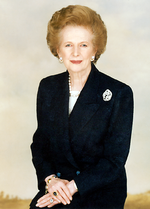Margaret Thatcher, Date of Birth, Place of Birth, Date of Death
TweetMargaret Thatcher
former Prime Minister of the United Kingdom
 Date of Birth: 13-Oct-1925
Date of Birth: 13-Oct-1925
 Place of Birth: Grantham, England, United Kingdom
Place of Birth: Grantham, England, United Kingdom
Date of Death: 08-Apr-2013
Profession: lawyer, politician, statesperson, chemist, barrister, business executive, autobiographer
Nationality: United Kingdom
Zodiac Sign: Libra 
About Margaret Thatcher
- Margaret Hilda Thatcher, Baroness Thatcher, (née Roberts; 13 October 1925 – 8 April 2013) was a British stateswoman who served as prime minister of the United Kingdom from 1979 to 1990 and leader of the Conservative Party from 1975 to 1990.
- She was the longest-serving British prime minister of the 20th century and the first woman to hold that office.
- A Soviet journalist dubbed her "The Iron Lady", a nickname that became associated with her uncompromising politics and leadership style.
- As Prime Minister, she implemented policies known as Thatcherism. She studied chemistry at Somerville College, Oxford, and worked briefly as a research chemist, before becoming a barrister.
- Thatcher was elected Member of Parliament for Finchley in 1959.
- Edward Heath appointed her Secretary of State for Education and Science in his 1970–1974 government.
- In 1975, Thatcher defeated Heath in the Conservative Party leadership election to become Leader of the Opposition, the first woman to lead a major political party in the United Kingdom.
- She became Prime Minister after winning the 1979 general election. Thatcher introduced a series of economic policies intended to reverse high unemployment and Britain's struggles in the wake of the Winter of Discontent and an ongoing recession.
- Her political philosophy and economic policies emphasised deregulation (particularly of the financial sector), flexible labour markets, the privatisation of state-owned companies, and reducing the power and influence of trade unions.
- Thatcher's popularity in her first years in office waned amid recession and rising unemployment, until victory in the 1982 Falklands War and the recovering economy brought a resurgence of support, resulting in her decisive re-election in 1983.
- She survived an assassination attempt in the Brighton hotel bombing in 1984. Thatcher was re-elected for a third term in 1987, but her subsequent support for the Community Charge ("poll tax") was widely unpopular, and her views on the European Community were not shared by others in her Cabinet.
- She resigned as Prime Minister and party leader in November 1990, after Michael Heseltine launched a challenge to her leadership.
- After retiring from the Commons in 1992, she was given a life peerage as Baroness Thatcher (of Kesteven in the County of Lincolnshire) which entitled her to sit in the House of Lords.
- In 2013, she died of a stroke at the Ritz Hotel in London, at the age of 87. Although a controversial figure in British political culture, she is nonetheless viewed favourably in historical rankings of British prime ministers.
- Her tenure constituted a realignment towards neoliberal policies in the United Kingdom and debate over the complicated legacy of Thatcherism persists into the 21st century.
Read more at Wikipedia
See Also
- Famous People's Birthdays on 13 October, United Kingdom
- Famous People's Birthdays in October, United Kingdom
- Famous lawyer's Birthdays on 13 October, United Kingdom
- Famous lawyer's Birthdays in October, United Kingdom
- Famous politician's Birthdays on 13 October, United Kingdom
- Famous politician's Birthdays in October, United Kingdom
- Famous statesperson's Birthdays on 13 October, United Kingdom
- Famous statesperson's Birthdays in October, United Kingdom
- Famous chemist's Birthdays on 13 October, United Kingdom
- Famous chemist's Birthdays in October, United Kingdom
- Famous barrister's Birthdays on 13 October, United Kingdom
- Famous barrister's Birthdays in October, United Kingdom
- Famous business executive's Birthdays on 13 October, United Kingdom
- Famous business executive's Birthdays in October, United Kingdom
- Famous autobiographer's Birthdays on 13 October, United Kingdom
- Famous autobiographer's Birthdays in October, United Kingdom

